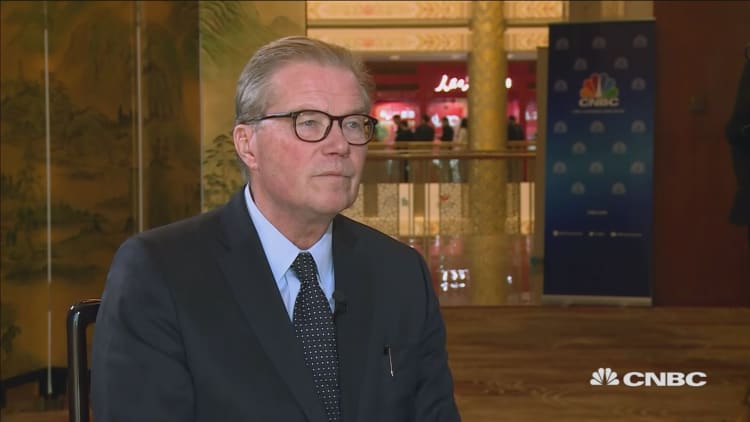Another day, another deal in the health care space.
AstraZeneca has agreed to a $6.9 billion collaboration with Japanese drugmaker Daiichi Sankyo to bolster its oncology franchise. Rather than a full acquisition, it's agreed to pay for the shared rights for a new cancer drug called DS-8201.
AstraZeneca plans to raise up to $3.5 billion through a share placing to fund the transaction as well as pay down debt. Analysts generally see the deal as a logical strategic move but note the equity raise may disappoint some investors.
AstraZeneca is a global, science-led biopharmaceutical company that focuses on the discovery, development and commercialization of prescription medicines. Oncology is one of their key strategic focus areas.
This transaction is intended to build specifically on their heritage in breast cancer as well as expand their treatment offering for other mutant tumors.
This is the first big strategic deal since Jose Baselga joined the company in January as the executive vice president for oncology research and development. Prior to joining the U.K.-based pharma giant, Baselga served as physician-in-chief at Memorial Sloan Kettering Cancer Center which became the leader in early-stage clinical trials for cancer therapies and diagnostic genetic sequencing. So this partnership sits firmly in his wheelhouse.
AstraZeneca CEO Pascal Soriot confirmed the company sees very strong synergy potential and financial rationale for this transaction during a conference call with investors.
UBS equity research analyst Michael Leuchten commented in a research note that it is a "strategically sensible licensing deal, but money looks tight."

He added: "The deal is structured well, in our view, reflecting the different levels of risk well. However, it seems Astra doesn't have the money and needs to place $3.5 billion in equity which seems expensive relative to debt."
AstraZeneca's outlook depends heavily on its pipeline products and new product launches.
J.P. Morgan Cazenove equity research analyst James Gordon notes: "Overall, we see the Daiichi asset as having significant potential … however, we are more mixed on the equity raise."
Over the next 12 months, Gordon expects to see a further re-rating of Astra shares as the market's confidence in Astra's strong long-term growth outlook increases.
When asked on the analyst call whether they would rule out any equity-funded acquisitions, management characterized the equity raise as "exceptional" noting it reflects the "exceptional" nature of this asset. They confirmed they do not intend to raise equity in a regular manner.
There has been a raft of health care companies riding the M&A (merger and acquisition) wave. Over the last year, tie-ups have emerged between Bristol-Myers Squibb and Celgene, Shire and Takeda, Roche and Spark Therapeutics among others.
Pharma companies across the globe are racing to replace legacy drugs by paying hefty premiums for access to more specialty treatments.
AstraZeneca, like the broader industry, is in the process of shifting away from a more primary-care focused portfolio to one that is more oncology-focused. The Daichii Sankyo collaboration requires no shareholder or regulatory approval.
AstraZeneca expects the transaction to have a neutral financial impact in 2019, growing core earnings per share from 2020 and then significantly contributing in 2023. The company has reconfirmed 2019 financial guidance.
Daichii Sankyo shares surged on the news while AstraZeneca shares slumped in early trade Friday.

